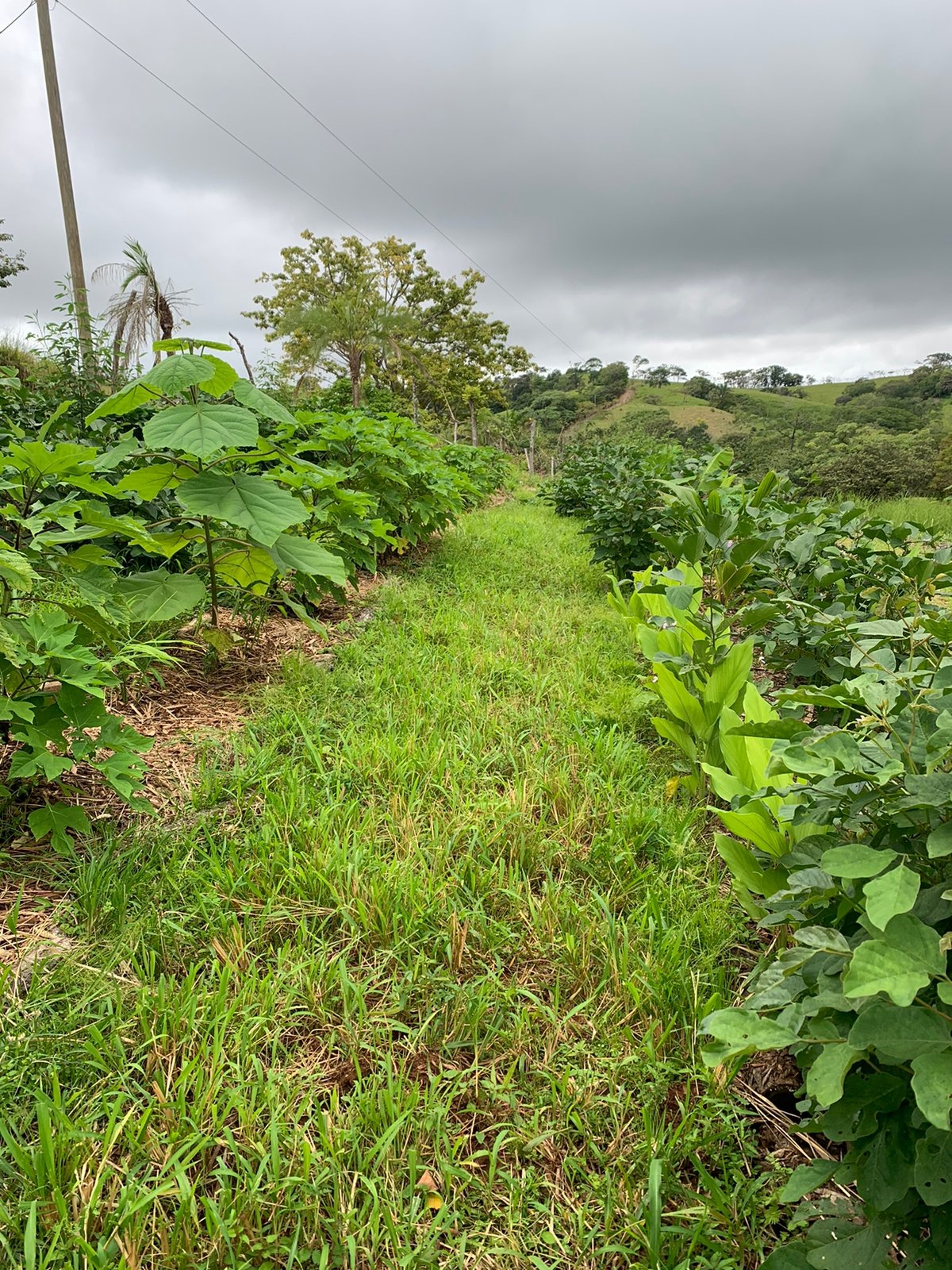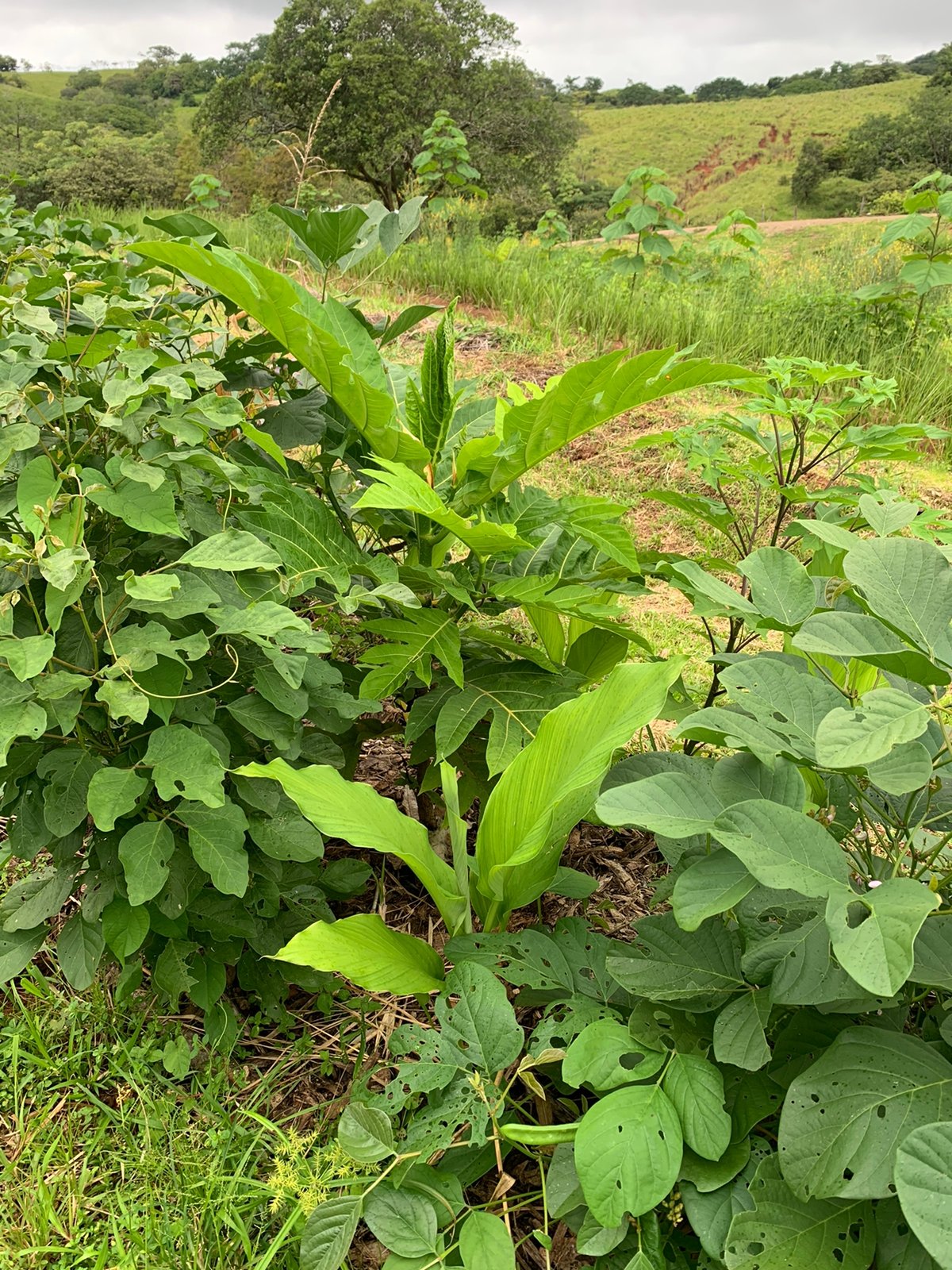Syntropic Farming Formation Course
Location: Tierramor, Nosara, Costa Rica
Course Description
This five day course is designed to create a complete formation in syntropic agriculture principles, design and implementation. The course will be led by Nat Muguet of Sitio Semente with Scott Gallant of Porvenir Design and Jorge Espinosa of Colectivo Waybil as co-instructor. The Tierramor farm crew will be providing significant support to the course and guiding the project installation.
Our teaching team brings a diverse set of skills, deep experience as pioneers in syntropic farming, and significant knowledge of the project bioregion and culture.
Using the Tierramor site as a functional classroom, this course will be both theoretical and practical, with a heavy portion of the class involving the installation of a 5000 sq meter orchard and the maintenaince of a one year old 5000 sq meter orchard.
What is Syntropic Agriculture?
Syntropic Farming is a process and principle based form of agriculture developed and propagated primarily in Brazil. Syntropic farming is a field within the larger domains of agroecology and agroforestry. Syntropic systems complement the food forest ideas within permaculture design by providing more specific design details, metrics, and arrangements that focus on precisely imitating the spatial and temporal relationships of the region’s native forest ecology. It has shown the ability to be scaled beyond many similar fields of agroecology. Syntropic agriculture provides a set of principles and tools for shifting from organic monocultures and input based agriculture towards a holistic focus on ecology. In the end it is a system that seeks to imitate the forest and results in a forest ecosystem.
The following links are key places to explore the topic.
Syntropic Agriculture Facebook Group
Hosting Organization
The farm at Tierramor exists primarily to trial and document the most innovative agricultural designs and practices for dry tropical forests. It seeks to do so by blending human and ecological needs and land use, creating an environment that integrates the many functions and needs of the project. The farm is the first phase, approximately 5 hectares, of a larger 200 hectare project.
Tierramor was specifically selected as a site for this course so that students can see a system which was installed in May of 2022; a one year old, half hectare orchard.
Tierramor offers a number of lodging options which are reflected in the course price options below. The course cost includes three vegetarian meals per day. For more information on lodging, food, how to arrive, and course enrollment, please visit:
Language
This course will be taught in Spanish with English translation provided. All the instructors can teach in both languages but the course will be taught in Spanish.
Who Should Attend This Course?
This course is designed to provide a complete tool kit for students to explore syntropic farming on their own. It will be an opportunity to go deep into topics and get practical hands-on experience installing a larger scale systems (5000 square meters). Students will get ample time for questions and answers with our diverse teaching team as well as the on the ground farm crew at Tierramor. This course will allow practitioners in Costa Rica and beyond form community around better land management practices.
All experience levels are invited into this course, as we will make time and space for understanding the basics of syntropic farming to exploring more advanced topics.
Course Material
Principles of Syntropic Farming:
Introduction to the concepts of agroforestry and syntropic agriculture
Exploration of the design and management patterns common to syntropic agriculture: density, diversity, layering, pruning and thinning
Landscape overviews:
How to restore the complete water cycle on our site and bioregion.
How to regenerate and conserve soil.
Survey of Existing Systems
Visit to one year old orchard
Agroecosystem assessment
Interpretation of errors and successes
Evaluation of stratification, natural succession, density, coverage, pruning, etc.
Site Analysis and Assessment
Using the Scale of Permanence for Site Analysis
How to interpret soil, water, microbial health and processes.
Survey of the history and past site use.
Design
Holistic Context creation as a tool for visioning, setting a project purpose and clear goals.
Site layout and orientation
Species selection and relationships
Placenta 1 and 2 dynamics as creators of the forest of the future
Choosing flagships species
Intercropping with trees for shading and pruning
Implementation on the Ground
How to start on degraded soils
Use of external inputs as a microlife catalyst
Planting:
Analysis of the planting area, choice of species, available resources
Formation of beds and alleys
How to work in different ecosystems: pasture, forest, etc.
Calculation of seeds, spacing, depth, construction of windrows, distance between rows, stratification
How to prepare the beds and intercrop the vegetables
Management:
How to sharpen tools
How to use and maintain a chainsaw and weed trimmer
Pruning as an engine of transformations
When and how to prune
Management of already implemented agroforestry
What to Bring
Students should come prepared to take notes in both a classroom and field setting. Much of the class will be taught in the field; we recommend bringing the following to the course:
Note taking materials: notebook(s), pens, pencils, tablet, as suits your needs
Rubber boots or other sturdy footwear suitable for field work
Sun protection: hat, long sleeves, sunscreen, sunglasses
Rain protection: umbrella, raincoat, rubber boots
Water bottle
Tools you prefer to use in the field such as machete, hand snips, or small pruning saws
Working gloves as preferred by participants
Instructors
Nat Muguet (Brazil) is an agroforestry producer, agronomist, ethnobotanical permaculturist, herbalist with over 13 years of experience in syntropic agriculture.
She is a follower of the teachings of Ernst Götsch. Pioneer of Agroforestry Systems aimed at the cultivation of Medicinal and Aromatic Plants. Nat Muguet worked in 2015 for the Eduardo Mondlan University in Mozambique with management community of natural forest resources. In 2016 she worked at ICRAF Malawi with implementation of syntropic agroforestry. In 2017 she coordinated and consolidated the first area of syntropic agriculture in Africa together with Ernest. The farm is in Mozambique in the state of Namacha. Since 2019 she is a farm collaborator and consultant in Kenya.
Since 2014 she has been a professor of syntropic agriculture at the Sitio Semente, where she is the owner and founder. Today the Sitio Semente is the biggest reference for a school of syntropic agriculture in the world. where more than 2,000 students passed each year. With areas of more than 15 years of work, it was possible to regenerate an area of 12 hectares degraded land in fertile forest soil, producing food and regenerative medicine. The heart of the work is a nursery of the highest quality of plants that are spreading the seeds throughout the four directions of the world. Nat provide design and teaching consultancy in several countries such as; Costa Rica, South Africa, Colombia, India, Mozambique, Chile, Mexico.
She can be found on instagram here.
Jorge Espinosa Mata (Mexico) is an agroforestry technician and consultant specialized in the implementation and management of SAFS and regenerative projects, as well as in the delivery of introductory and advanced courses in various ecosystem climates in Mexico and Costa Rica. He has trained with experts in syntropic agriculture and agroforestry systems on farms in Brazil and Mexico.
He teaches syntropic farming course with a diverse team as part of Colectivo Waybil and offers professional consultation through his Agrosintropica.
Scott Gallant (USA) is an agroforestor and food system designer with over a decade of experience working in Central America. He is the co-founder of Porvenir Design, a landscape design firm specializing in productive landscapes. He graduated from Wabash College in 2008 with a degree in Economics. He was the farm manager at Rancho Mastatal for nine years, and has worked with diverse projects such as VersaLand, Open Source Ecology, Project Bonafide and many more as he has developed his skill-set in permaculture design.
Passionate about regenerative agriculture, holistic thinking, ethnobotany, community development, and re-skilling, he still makes time to hike and bike, read exhaustively, and work on his basketball jump shot and frisbee throw. He has traveled extensively in Latin America, leading to a love of the culture, food, and language, which he attempts to speak. Scott writes for the Permaculture Research Institute and has been featured on the Permaculture Voices , Abundant Edge, and Making Permaculture Stronger podcasts.
Course Start and Arrival Date
The course begins at 9AM on Wednesday, May 24, 2023.
Lodging and dinner is provided for the night of May 23rd for students paying for lodging as part o their course fee.
Parking is available on site. A 4 x 4 vehicles is required to reach the site.
Course Close and Departure Date
The agroforestry course will end at 4PM on Sunday, May 28, 2023.
Lodging and dinner is provided for the night of May 28th for students paying for lodging as part of their course fee. Breakfast will be provided the morning of May 29th.
Costs
Day Pass (no lodging): $340
Private Suite: $940
Private Cabin: $820
Shared Cabin 2 People: $540
Shared Cabin 4 People: $480
Shared Bell Tent 2 People: $500
Scholarships
There are two full scholarships available for this course. These are reserved for Costa Ricans. To apply for these scholarships, please write to hugosoto@porvenirdesign.com.
Enrollment
For course enrollment please visit the Tierramor Webpage here.














